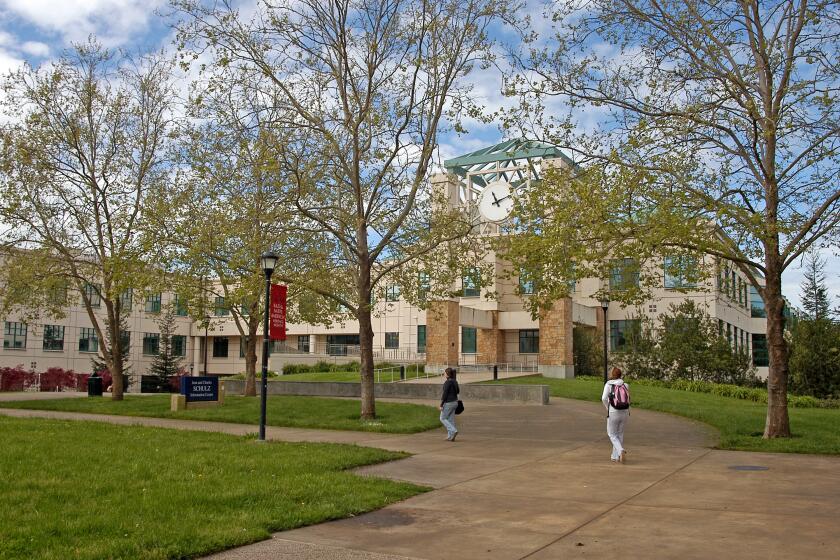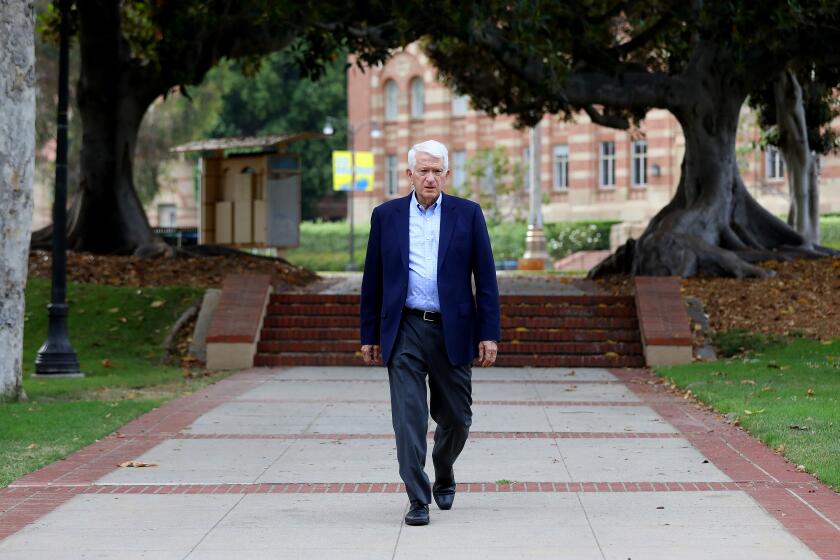Money Top Goal of College Freshmen
The Beatles had a hit on college campuses with a song that began: “The best things in life are free, but you can keep them for the birds and bees. Now give me money. That’s what I want.”
That was more than 40 years ago, but those words ring especially true to college students today, according to a national survey of student attitudes.
A record-low percentage of college freshmen said it is very important or essential to “develop a meaningful philosophy of life.” Meanwhile, interest in being “very well off financially” was at 73.8%, the highest level in 13 years.
Those findings appear in the American Freshman Survey, an annual study released today by UCLA. The survey, which has been conducted for 38 years, is the longest-running assessment of student attitudes and plans.
This year’s study surveyed 267,449 students at 413 colleges and universities, and was statistically adjusted to reflect the 1.2 million full-time freshmen in 2003.
Fewer than 40% of current college freshmen believe it is important to develop a meaningful philosophy. The absence of introspection is a far cry from the peak year of 1967, when 86% of freshmen said it was important to find a meaningful life philosophy.
Linda J. Sax, a UCLA education professor who is director of the survey, said the finding reflects a long-standing tension “between material rewards and the value of education” among students, which has intensified in recent years.
“There’s increasing pressure to get in” to college, she said, because many schools accept a smaller percentage of applicants each year.
Students also are increasingly “preoccupied with prestige and rankings of colleges,” making them more concerned with where they are going to school rather than “why they are going,” Sax said.
At USC, Dustin Grant, a 19-year-old freshman from Pomona, said the survey results matched his views of what students feel as they leave high school.
Freshmen commonly believe “the reason you go to college is to get the degree so you can make a lot of money. At USC, in particular, students who come in are not too concerned about life goals or philosophy,” he said.
A business major, Grant thinks the high cost of college today fuels materialism. “This is a major investment -- like 40,000 bucks a year. When you’re putting so much in, you’re going to expect to get something out of it,” he said.
Grant sat with three friends outside their dormitory chatting between classes Friday afternoon. All agreed that high costs force students to be concerned about money.
Erwin Chaloupka, who lived in Prague, Czech Republic, until he was 14, said students in Europe, where colleges are mainly public and charge very low tuition, had less materialistic attitudes.
“My friends there don’t think about money as much,” said Chaloupka, 19, a freshman. “Of course they want a house and a car, but money’s just not as important. We cared a lot about philosophy there.”
But Amar Patel, 18, said time in college is likely to affect many students’ attitudes. He said required courses in humanities and the intellectual life on campus encourage students to think critically about their values and beliefs.
College “opens up new perspectives,” he said, contending that seniors probably would express a greater concern for finding meaning in life. His friends nodded in agreement.
“We know some seniors who are really different,” Grant said.
Sax, the study director, said other research looking beyond the freshman year confirms Patel’s observation.
Learning for its own sake might not be a high priority for many new college students, she said, “but it becomes more important throughout college. That’s good news.”
The USC freshmen tied another of the survey’s findings to the increasingly competitive college environment. The survey reported that a record-setting 83% of students participated in volunteer work. That statistic drew grimaces from the four students.
Andrew Ramirez, 18, said the altruism reflected in that number is tainted by careerism.
“If you want to go to graduate school, it’s something you have to do, like an extra course,” he said of volunteer work.
“You get extra credit in some of your classes,” Chaloupka added.
In high school, Grant said, his campus required 100 hours of community service for graduation, and students thought they needed to perform such activities to get into top colleges.
The USC students said the college environment nationwide seems more pressured than what they believe it to have been like a generation ago.
“I’d rather live in the ‘60s or ‘70s,” Patel said a bit wistfully. The others nodded.
Other noteworthy findings in this year’s survey:
* Students earning A averages hit a record high of 47%, compared with 18% in 1968. That apparent grade inflation “shows that as the A average becomes the norm, the C grade is becoming a thing of the past,” said Alexander W. Astin, the UCLA education professor who founded the survey.
* Interest in politics is rising, with one-third of students saying it is important to keep up to date with political affairs. The figure has been rising since 2000, but is still far lower than the 60% of students interested in keeping up with politics in 1966.
* Drinking, smoking and partying hit record low rates, continuing a decade of decline. For example, only about 45% of freshmen said they drank beer frequently or occasionally, compared with a peak of 74% in 1982. Only about 24% said they attended parties six hours or more a week, down from 37% in 1987, when that question was first asked on the survey.
More to Read
Start your day right
Sign up for Essential California for news, features and recommendations from the L.A. Times and beyond in your inbox six days a week.
You may occasionally receive promotional content from the Los Angeles Times.






